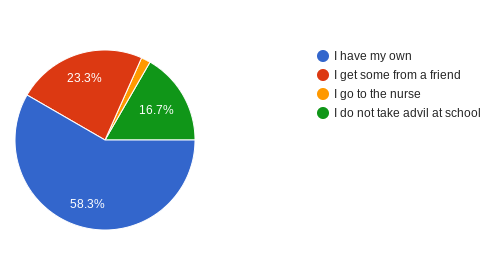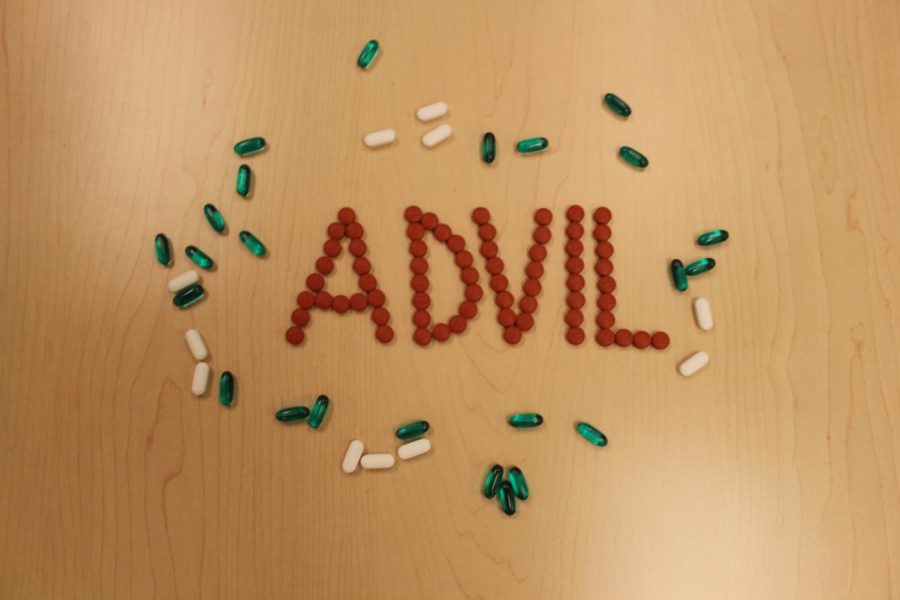Poppin’ Pills in Public Schools: Should Students Be Allowed to Self-Medicate?
February 6, 2019
What’s poppin’? Advil. But it is a hard pill to swallow that at Charlottesville High School students are not allowed to give themselves a simple pain reliever, such as Ibuprofen. In a recent survey, 81.6% of students(49 out of 60 students) responded that they take Advil at school, either from a friend or their own personal supply.

According to the Student Handbook, “Sharing, borrowing, distributing, manufacturing or selling any medication is prohibited.” While this rule is harsh there are many exceptions. For a student to be able to self-administer medication the following conditions must be met according to the student handbook:
- Written parental permission for self-administration of specified non-prescription medication is on file with the school.
- The non-prescription medication is in the original container and appropriately labeled with the manufacturer’s directions.
- The student’s name is affixed to the container.
- The student possesses only the amount of non-prescription medicine needed for one school day/activity.
While on the surface, self-administering advil seems that a simple procedure, but CHS Nurse Ann Sandridge exposes many possible health risks. Nurse Sandridge says that “[She has] seen lots of students take far more [Advil] than necessary and has had to take them to the emergency room.” Even simple issues can arise from taking an Advil. Nurse Sandridge points out, “Advil can mask something serious that is going on.” In her 20 plus years as school nurse she has seen everything, including overdose, and even something as mundane as mixing up pills and taking something instead of advil.
But a staggering 95% of students say that they feel students should be allowed to take advil at school. Students cite reasons such as not wanting to miss class time to go to the nurse, teachers not allowing them to go to the nurse, and many students just flat out disagree with the policy.
One anonymous student says, “Students at CHS are responsible enough to take their own advil. Some of us are old enough to legally vote, shouldn’t we also be able to take advil by ourselves? Not to mention that many students have periods, and when cramps get bad, we don’t want to have to go down to the nurse every day for a week, especially when it happens every month.”
Furthermore, almost a third of students reported that they did not know they couldn’t have Advil at school. One students feels that “[the Advil policy] is a ridiculous rule and maybe if the administration would communicate with the students, we’d be more understanding.” Unfortunately this a policy that will not be changing any time soon as it is not only dictated by the school system, but by the state. An interview with Principal Dr. Eric Irizarry reveals that “State policy..says that students are not allowed to carry medication at school.”
While the Advil policy is strict, the most important thing is to ensure that students are not in pain at school.
According to the Student Handbook, “Sharing, borrowing, distributing, manufacturing or selling any medication is prohibited.” While this rule is harsh there are many exceptions. For a student to be able to self-administer medication the following conditions must be met according to the student handbook:
- Written parental permission for self-administration of specified non-prescription medication is on file with the school.
- The non-prescription medication is in the original container and appropriately labeled with the manufacturer’s directions.
- The student’s name is affixed to the container.
- The student possesses only the amount of non-prescription medicine needed for one school day/activity.
While on the surface, self-administering advil seems that a simple procedure, but CHS Nurse Ann Sandridge exposes many possible health risks. Nurse Sandridge says that “[She has] seen lots of students take far more [Advil] than necessary and has had to take them to the emergency room.” Even simple issues can arise from taking an Advil. Nurse Sandridge points out, “Advil can mask something serious that is going on.” In her 20 plus years as school nurse she has seen everything, including overdose, and even something as mundane as mixing up pills and taking something instead of advil.
But a staggering 95% of students say that they feel students should be allowed to take advil at school. Students cite reasons such as not wanting to miss class time to go to the nurse, teachers not allowing them to go to the nurse, and many students just flat out disagree with the policy.
One anonymous student says, “Students at CHS are responsible enough to take their own advil. Some of us are old enough to legally vote, shouldn’t we also be able to take advil by ourselves? Not to mention that many students have periods, and when cramps get bad, we don’t want to have to go down to the nurse every day for a week, especially when it happens every month.”
Furthermore, almost a third of students reported that they did not know they couldn’t have Advil at school. One students feels that “[the Advil policy] is a ridiculous rule and maybe if the administration would communicate with the students, we’d be more understanding.” Unfortunately this a policy that will not be changing any time soon as it is not only dictated by the school system, but by the state. An interview with Principal Dr. Eric Irizarry reveals that “State policy..says that students are not allowed to carry medication at school.”
While the Advil policy is strict, the most important thing is to ensure that students are not in pain at school.





